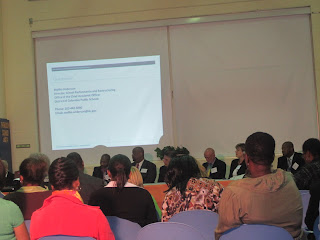The Cleveland Elementary School gym was filled with parents and other community members as they anxiously waited to hear what the panel in front of them had to say.
Chancellor Michelle Rhee approached the podium with one mission in mind: to properly educate the children of the District of Columbia public schools. Rhee spoke to the gym saying that the best way to educate children is to discover their strengths and interests and work from there.
“We believe learning should be fun,” Anderson said. “Learning is enjoying.”
Rhee informed the audience that they were implementing a plan to best educate children enrolled in the D.C. public school system. Rhee along with several other speakers introduced the Comprehensive School Plan. This plan is a two-year school improvement plan for all schools. The purpose of the plan is to detail where the school is headed as well as how it will get there.
As part of this plan, Rhee introduced ten out of the twelve instructional superintendents available at the time, who oversee the D.C. public schools. Barbara Adderly, Amanda Alexander, Clara Canty, Errick Greene, Eric Redwine, Stephen Zagami, Lolli Haws, Wayne Ryan, John Davis and Bill Wilhoyte all approached the podium, one by one. The instructional superintendents each gave a brief introduction, outlining their work experience in school systems, their personal background, and some of their objectives
The audience sat, listening as the speakers introduced themselves while wondering why. How will they contribute to this “plan”? As the forum progressed, the crowd soon understood what valuable assets these superintendents really were and how they will help reshape the D.
“It’s all about what the children deserve,” Greene said.
Fundamentally, these instructional superintendents demonstrated through their introductions and background that they are motivated and know how to run great schools. The superintendents bring resources that the principals may need. Furthermore, they build a group of strong principals as they play a hand in succession planning, to ensure perpetual strong leadership among the D.C. public schools.
“My job is to help the teachers and staff to ultimately reach their potential,” Haws said.
Following the superintendents’ brief introduction, Malika Anderson, the Director of School Performance and Reconstructing, outlined the details of the Comprehensive School Plan. With two of her kids currently enrolled in D.C. public schools, Anderson demonstrated to the listeners how she is determined to continue to improve the standards of the city’s school system.
“Success is not an option,” Anderson said.
As the plan is called a “comprehensive” school plan, Anderson made a point to emphasize the details of the plan.
“We’re all about fine print and asking for your help,” Anderson said.
At length, the Comprehensive School plan is comprised of three stages:
· Comprehensive Needs Assessment
· Peer Review and Revision
· Progress Monitoring, Communications, and Support

“We have to know where we are to progress,” Anderson said.
In the following stage, Peer Review and Revision, plans are reviewed and given feedback. The peer review is comprised of a central office filled with experts knowledgeable about school improvement. In addition, the Local School Advisory Team (LSAT) and school leadership takes appropriate action to revise and finalize the school’s plan. Anderson stressed that as these plans were implemented with the purpose of continuous improvement, they will have high expectations. However, in order for schools to really experience success, these expectations must be realistic and be built within the particular school’s framework.
The final stage of this plan, Progress Monitoring, Communications and Support, is implemented in order for these plans to effectively continue while accompanied with ongoing improvement and success. In this final stage, there are monthly informal and quarterly formal progress reports. As a complement to these reports, there are quarterly LSAT meetings as well. As community involvement has been continually stressed, there will still be at least two school community forums a year to discuss plan, progress and participation in the D.C. school systems. Beyond the panel of superintendents, parent involvement is stressed at the classroom level.
“We want our teachers, principals and students to feel valued and supported,” Anderson said.
This plan helps ensure that principals have the best instructional plans for their students.
“Our job is to create chains of thought to exchange ideas with the principals in order to better run the D.C. schools,” Greene said.
The Comprehensive School Plan is designed to reflect the most current needs of the students, assuring schools to effectively teach and nurture their students.
“These plans represent the core thrust of school improvement in each of these buildings,” Anderson said.
No comments:
Post a Comment